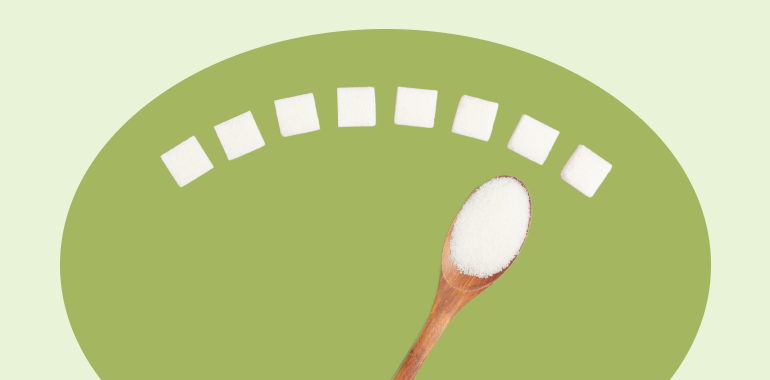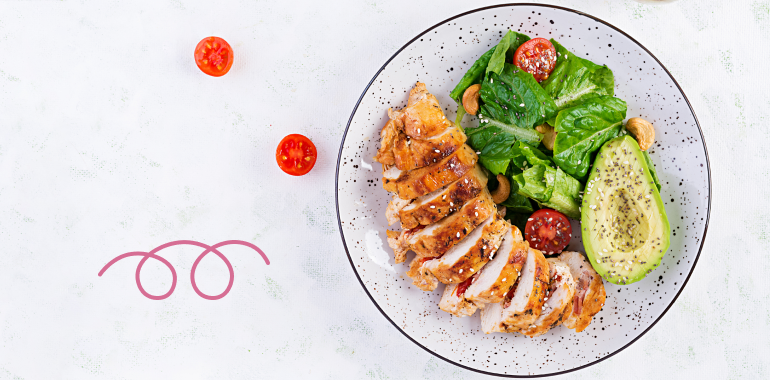Table Of Contents
What is a Keto Diet, and How Does it Affect Sugar Intake?
A ketogenic diet (or “keto” for short) is a high-fat, moderate protein, and very low-carbohydrate diet that has been shown to help people lose weight and improve specific health markers such as blood sugar control and cholesterol levels.
The goal of a keto diet is to enter a state of ketosis, where the body switches from using glucose (sugar) as its primary fuel source to using ketones, which are produced from fat when carbohydrate intake is limited.
Also, read – Low Carb Breakfast Without Eggs: Ideas & Advice
When following a diet, it is essential to consume a small amount of sugar on keto as much as possible, as sugar is a type of carbohydrate that can quickly raise blood sugar and insulin levels. This can make it difficult to achieve and maintain a state of ketosis. Instead, keto dieters often choose to sweeten their food and beverages with low-carbohydrate sweeteners like stevia, erythritol, or sucralose, which do not affect blood sugar levels.
In addition to limiting sugar intake, keto dieters also need to pay close attention to the number of carbohydrates in their diet, as even small amounts of carbs can cause blood sugar and insulin levels to rise, disrupting ketosis. This means avoiding high-carbohydrate foods like bread, pasta, rice, and sugar-laden desserts and instead focusing on low-carbohydrate, high-fat foods like meats, fish, nuts, seeds, and healthy oils.
This has the added benefit of reducing sugar intake because your body no longer needs it to function correctly. Not only does this reduce total calorie intake, but it sacrifices little in terms of flavor and texture, as keto-friendly recipes tap into healthy alternatives like olive oil, avocado oil, and nut butter instead of sugary ingredients common in traditional cooking.

Can You Have Sugar on Keto – The Different Types
The keto diet is known for its strict carbohydrate adherence and low-sugar emphasis. It is certainly possible to still have sugar in a keto diet, but it must be done with precision and moderation.
For the keto diet to work correctly, your daily carb intake should stay below 25–50 grams per day of net carbs. So when choosing a sugar to add to your diet, be sure to factor in the sugar’s associated carbs in order to stay within your budget.
Here are some types of sugar that can be consumed in small amounts on a keto diet:
- Natural sugars: Small amounts of natural sugars from whole foods like fruits and vegetables can be incorporated into a keto diet. However, choosing low-carbohydrate options, such as berries, avocados, and leafy greens, is vital.
- Artificial sweeteners: Low-carbohydrate sweeteners like stevia, erythritol, and monk fruit extract are commonly used in keto-friendly desserts, drinks, and snacks. These sweeteners do not raise blood sugar levels and are generally considered safe.
- Sugar alcohols: Sugar alcohols like xylitol, sorbitol, and maltitol are often used in low-carb products as a sugar substitute. While they are lower in carbs than regular sugar, they can still impact blood sugar levels and cause digestive issues in some people.
- Other sweeteners: Some sweeteners, like allulose, have recently become more popular in the low-carb and keto communities. Allulose is a low-calorie sweetener that does not raise blood sugar levels and can be used in small amounts.
While it is possible to include small amounts of sugar on a keto diet, monitoring your carbohydrate intake and choosing low-carbohydrate options to stay in ketosis is essential. Additionally, it’s recommended to consult with a healthcare professional to determine the best approach for your individual dietary needs.
Finally, using moderate portion sizes can really help you on your journey if you choose to include sugar in your lifestyle!
Also, read – Keto vs Intermittent Fasting: What’s the Difference?
Is Sucralose Keto Friendly?
Yes, Sucralose is generally considered keto-friendly. Sucralose is a zero-calorie artificial sweetener that does not contain any carbohydrates or sugars, which means it does not affect blood sugar or insulin levels. This makes it a popular sweetener choice for people following a ketogenic diet or low-carb diet.
Sucralose is commonly used in many low-carb and keto-friendly products such as sugar-free gum, protein bars, and powdered drink mixes. However, it is essential to note that while sucralose is considered safe by many health organizations, some people may experience side effects such as digestive issues or headaches.
As with any food or ingredient, it is recommended to consume sucralose in moderation as part of a balanced and varied diet.Daily Sugar Intake on Keto Sugar Amount Ketogenic Diet (Strict) Less than 20 grams per day Ketogenic Diet (Moderate) Less than 50 grams per day Ketogenic Diet (Liberal) Less than 100 grams per day
How Much Sugar Will Stop Ketosis?
The amount of sugar that will stop ketosis can vary from person to person, depending on factors such as metabolic rate, activity level, and individual carbohydrate tolerance.
Consuming more carbohydrates than your body can use for energy can lead to an increase in blood sugar levels, which can trigger the release of insulin. Insulin helps to move glucose out of the bloodstream and into cells for energy, but it also signals the body to stop producing ketones and shift back to using glucose as its primary fuel source. This can lead to a decrease in the state of ketosis.
- As a general rule, consuming more than 50 grams of net carbs per day is likely to significantly decrease the level of ketones in the blood and potentially stop ketosis, depending on the individual.
However, some people may be able to consume more carbohydrates and still maintain ketosis, while others may need to consume fewer carbohydrates to stay in ketosis.

How Many Carbs in a Tablespoon of Sugar?
A tablespoon of granulated white sugar typically contains about 12.5 grams of carbohydrates. This is equivalent to 1 tablespoon of any type of granulated sugar, such as white, brown, or raw sugar.
These simple sugars are quickly metabolized by the body, which raises blood sugar levels rapidly and can cause a spike in insulin if partaken in excess.
As part of a balanced lifestyle, informed decisions about sugar intake should be made; for example, using honey as a natural alternative to processed sugar is a way to reduce the number of overall carbs ingested without sacrificing taste or sweetness.
Also. read – Easy Keto Breakfast Ideas to Stay In Ketosis
Understanding the Role of Insulin in Regulating Blood Glucose Levels on a Keto Diet
When it comes to achieving and maintaining optimal health on a keto diet, understanding the role of insulin in regulating blood glucose levels is essential. This vital hormone the pancreas produces helps transport glucose from the bloodstream into cells for energy and storage.
Insulin levels decrease on ketogenic diets due to lower carb intake, potentially improving metabolic health over time. But, then, caution about accidentally eating sugar on keto must be taken to avoid low insulin levels from leading to hypoglycemia. Therefore, monitoring both pre and post-meal glucose levels to ensure they are within an acceptable range is essential.
However, it’s important to note that consuming too much protein on a ketogenic diet can also increase blood glucose levels and insulin release. This is because excess protein can be converted into glucose through gluconeogenesis.
Furthermore, increasing fiber and nutrient-dense sources of healthy fats can support overall immune health as well as help balance out insulin production.
Therefore it’s vital to take an integrative approach towards optimizing your nutrition while following a keto diet, staying mindful of your glycemic control at all times. In addition, to maintain a state of ketosis and stable blood glucose levels on a ketogenic diet, it’s important to keep carbohydrate intake within the recommended range and monitor protein intake.
Can You Eat Sugar-Free Candy on Keto?
For individuals on the Keto diet, sugar-free candy can be a great snack choice. Whether or not you can eat sugar-free candy on a keto diet depends on the specific ingredients used in the candy. Many types of sugar-free candy contain artificial sweeteners, such as aspartame, sucralose, and erythritol, which can be keto-friendly.
While sugar-containing candy should always be avoided, many sugar-free candies contain low net carbs and significant amounts of healthy fats, making them excellent dietary options so long as they are consumed in moderation.
- Erythritol is a sugar alcohol commonly used in sugar-free candy and is often considered keto-friendly because it has a minimal impact on blood sugar levels and insulin response. However, it’s important to note that some people may experience digestive discomforts, such as gas or bloating when consuming large amounts of sugar alcohol.
- Other artificial sweeteners, such as aspartame and sucralose, are also considered low or no calories and have little to no impact on blood sugar levels. However, there is some debate about the potential health risks associated with the long-term consumption of these artificial sweeteners.
Consuming sugar-free candy in moderation and being mindful of overall carbohydrate intake is vital, as consuming too many carbohydrates, even from sugar-free sources, can hinder weight loss and ketosis.
In general, it’s best to choose whole, nutrient-dense foods on a ketogenic diet and to view sugar-free candy as an occasional treat.
Also, read – Are Eggs Keto? Plus, Other Foods
How Much Sugar Can You Have on a Keto Diet?
The amount of sugar you can consume on a keto diet varies depending on your goals. Generally speaking, keeping added sugars or refined carbohydrates low is best when following the keto diet plan.
Either way, paying attention to where your sugar comes from is essential; sticking with natural foods and avoiding products with unnecessary artificial ingredients and added sugars should always be prioritized.
How Many Grams of Sugar Can You Have On Keto?
For those looking for rapid weight loss, a good starting point would be to limit daily sugar intake to 5-10 grams of natural sweeteners like stevia or erythritol and an occasional piece of fruit (which should be factored into your carb count).
Meanwhile, if maintenance is the main focus and the primary goal is health optimization, then slightly higher amounts of sugar, such as 25-50 grams per day, may be more appropriate.
Keto Sugar Limit: Using Sweeteners & Alternatives
The keto diet has a strict limit on natural sugars and carbohydrates, but this doesn’t mean that sweet treats are off the menu. Instead, creative cooks find alternatives to traditional sugar and add net carbs to their diets.
Many low-carb sweeteners on the market today make living a keto lifestyle still possible, even if you have a sweet tooth. Alternatives like stevia or monk fruit offer naturally zero-calorie substitutes for daily needs like baking and smoothies.
Though these may not suit everyone, they are essential to staying on track with your keto diet and avoiding too many restrictive feelings.
Some of the most popular keto-friendly sweeteners and alternatives include:
- Stevia:
A natural sweetener derived from the leaves of the stevia plant. Stevia has zero calories and zero carbohydrates and is commonly used as a sugar substitute.
- Erythritol:
A sugar alcohol that is often used as a low-carbohydrate sweetener. Erythritol has a zero glycemic index and is usually well-tolerated by most people.
- Xylitol:
Another sugar alcohol is commonly used as a sweetener. For example, Xylitol has a glycemic index of 13 and may benefit dental health.
- Monk fruit extract:
A natural sweetener derived from monk fruit with zero calories and zero carbohydrates.
- Allulose:
A rare sugar that has a similar taste and texture to regular sugar but with fewer calories and a lower glycemic index.
Final Thoughts: Small Amount of Sugar on Keto Guaranty Your Success
In conclusion, it’s important to note that sugar has many potential negatives regarding the ketogenic diet. While it may be okay in small amounts, more significant amounts should generally be avoided.
The best way to approach this is by reading nutrition labels carefully and staying conscious of your added sugar intake. This way, you can ensure that the sugars and carbs you do consume are part of a well-rounded keto-friendly meal plan.
Of course, like with any diet, minor tweaks and adjustments might need to be made as you go along, but having a solid understanding of how much sugar to have on keto will set any individual off on the right dietary path.
Rebecca is a nurse, yoga teacher, and freelance copywriter with a passion for holistic health and self-development. When she’s not working in the health sector, she enjoys hiking the outdoors, cooking, and traveling.










Thank you for the full information and the answer to the question how much sugar can you have on keto.
Hello, Liza 👋
Certainly! Happy to help with the info on sugar limits for keto.